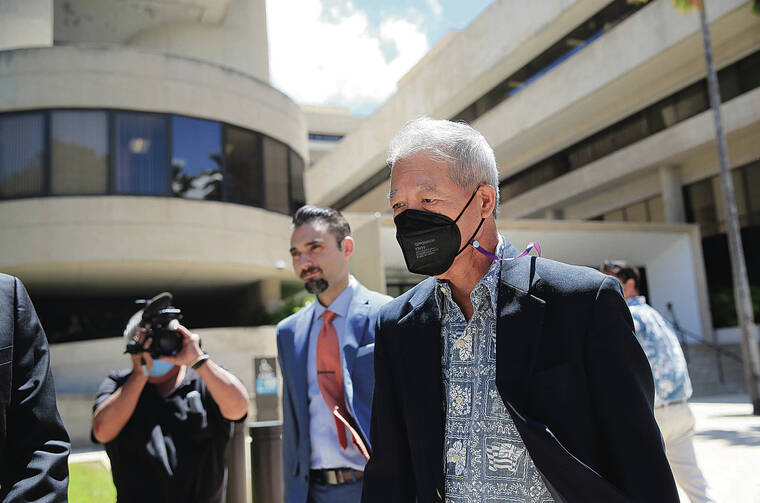The federal trial of former Honolulu Prosecuting Attorney Keith Kaneshiro and
politically prominent architecture and engineering executive Dennis Mitsunaga was pushed back to March, a U.S. Magistrate Judge ruled Tuesday.
U.S. Magistrate Judge Wes Reber Porter considered Mitsunaga’s second motion to continue after federal prosecutors and defense attorneys agreed to push back the trial from its original date in September but disagreed on how long to delay it.
Assistant U.S. attorneys from San Diego serving as special attorneys to the attorney general secured an indictment June 2 Opens in a new tab against Kaneshiro, 72, and Mitsunaga, 78, president and CEO of Mitsunaga &Associates, or MAI, and a longtime
Hawaii campaign contributor, after they allegedly conspired to charge a former MAI employee with theft in exchange for campaign
contributions.
Also indicted on charges of conspiracy to commit honest services fraud, federal program bribery and conspiracy to violate rights were Terri Ann Otani, 66, MAI corporate secretary and office manager; Aaron Shunichi Fujii, 64, MAI’s executive vice president and chief operating officer; and Chad Michael McDonald, 50, MAI senior vice president.
All have pleaded not guilty and are free on $50,000 bonds pending trial.
“All Parties agree that the September 13, 2022 trial date is not realistic, and a continuance is needed. The sheer volume of discovery alone necessitates a lengthy continuance,” wrote Mitsunaga’s attorney, John M. Schum, in the July 27 second motion to continue trial. “Because of conflicting schedules and obligations, the Parties could not come up with a mutually agreeable date. Additionally, the voluminous and complex discovery will cause the Parties to seek to have the case declared complex.”
The U.S. Department of Justice filed a response to Mitsunaga’s motion Friday.
“The United States understands the defense will seek a continuance to the fall of 2023 or early 2024,” wrote Assistant U.S. Attorney Andrew Y. Chiang. “While we do not agree to that request, we defer to the Court’s discretion on the matter.”
Assistant U.S. Attorney Joseph M. Orabona told Porter’s court Tuesday that the government sought a March 2023 start. The government’s case would take 10 to 12 trial days to present, Orabona said in court Tuesday.
“I believe the majority of the discovery they have to date is the bulk of the discovery we will be producing,” he told Porter.
Porter pointed out that he takes general issue with attempts to delay trials due to conflicting court calendars kept by attorneys involved with the case.
“We would almost never be able to set up a trial date,” said Porter, speaking in court Tuesday.
McDonald’s attorney, Thomas M. Otake, agreed with Porter, calling it unfair to ask for a continuance of more than a year.
“It’s (the government’s allegations) weighing on him and the other defendants, and I object to that long of a continuance.”
Porter scheduled the trial for March 21 at 9 a.m. before Chief U.S. District Judge J. Michael Seabright.
The allegations outlined in the June 2 indictment stem from MAI’s handling of former MAI employee Laurel Mau, who sued the company after she was let go in November 2011. Mitsunaga and his employees allegedly tried to block Mau’s applications for unemployment benefits from the state. After a year a Circuit Court judge ruled Mau was eligible to receive the unemployment benefits.
In an August 2012 lawsuit, Mau accused MAI of violating the Civil Rights Act of 1964 and Age Discrimination in Employment Act of 1967. In October 2012, Mitsunaga met with Kaneshiro, whom he supported politically, “to attempt to persuade Kaneshiro to investigate and prosecute” Mau for allegedly working “side jobs” while on company time, according to the federal court documents.
Following the meeting, Mitsunaga, Otani, Fujii and McDonald and other Mitsunaga family members and employees donated about $45,000 to Kaneshiro’s campaign, according to the U.S. Department of Justice.
In July 2014 a federal judge overseeing Mau’s lawsuit and several counterclaims by MAI found no liability other than a “breach of loyalty” claim against Mau for which she awarded the firm $1.
Kaneshiro prosecuted Mau for four counts of theft at the firm’s request in December 2014, according to state court records. When one deputy prosecutor told Kaneshiro that there was not enough evidence to prosecute Mau, Kaneshiro allegedly reassigned the case to another prosecutor, who charged Mau, according to the federal court documents.
In July 2017 the charges against Mau were dismissed with prejudice, meaning they could not be refiled. Kaneshiro indicated he wanted to appeal the ruling but did not, according to the indictment.
Kaneshiro served as city prosecutor from 1988 to 1996 and again from 2010 to 2018 before he went on paid leave.
Mitsunaga was “permitted to have temporary contact with the other co-defendants and any potential witnesses in this case on Friday, July 29, 2022, at the funeral service for Mr. Mitsunaga’s son,” according to a stipulation approving temporary modification of pretrial release filed July 28.
“Permitted contact with the other Co-Defendants and any potential witnesses is only allowed during the funeral service at Iolani School, and Mr. Mitsunaga is prohibited from discussing this pending case with the other Co-Defendants and any potential witnesses in this case while there,” read the modification.
Otake declined comment following Tuesday’s hearing.
Kaneshiro’s attorney, Birney B. Bervar; Schum; Otani’s attorney, Doris Lum; and Fujii’s counsel, Miles Booth, did not immediately reply to a Honolulu Star-
Advertiser request for
comment.

